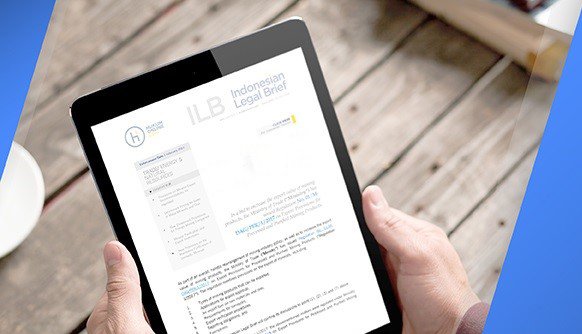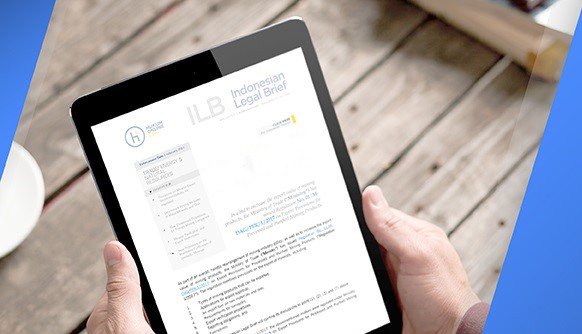
Indonesia Officially Bans E-Commerce Transactions on Social Media
Concern has been growing recently among various parties relating to micro-, small- and medium-scale enterprises (“MSMEs”) and more generally across the nation regarding social-media platforms (“Social Media”) that engage in trading activities via electronic systems (perdagangan melalui sistem elektronik – “PMSE”). This concern centers on the fact that conventional merchants and MSMEs are being negatively affected by such online trade and are sustaining significant losses. In this regard, the Minister of Trade (“Minister”) has only amplified this concern by affirming that any Social Media that simultaneously engage in PMSE business activities have the potential to become highly profitable through the use of Social Media user algorithms that assist in the displaying of product advertisements that are closely matched to the preferences of Social Media users.
Given this ominous situation and in an attempt to further empower the nation’s MSMEs, the Minister has issued Regulation No. 31 of 2023 on Business Licensing, Advertising, Guidance and Supervision of Businesses in Trade Through Electronic System (“Regulation 31/2023”), which has been in force since 26 September 2023. Upon entering into force, Regulation 31/2023 repealed and replaced the previous framework on PMSE-related prerequisites, i.e. Regulation of the Minister No. 50 of 2020 (“Regulation 50/2020”), which bore a similar title to the new framework of Regulation 31/2023.
At its core, Regulation 31/2023 retains the scope of the domestic and overseas business actors that originally featured under Regulation 50/2020 and that encompass the following parties: 1) Merchants (pedagang); 2) Organizers of PMSE (penyelenggara PMSE – “PPMSE”); and 3) Intermediary service organizers (penyelenggara sarana perantara/PSP). However, newly introduced under Regulation 31/2023 is a further clarification of the scope of the various business models that are available to domestic and overseas PPMSE, as summarized in the table below:

Social Commerce, Marketplaces and Online Retailing : Applicable Prohibitions
At its core, Regulation 31/2023 affirms that whenever they engage in PMSE activities, business actors are required to comply with relevant laws and regulations that relate to certain aspects, including:

In terms of PPMSE business activities that take the form of social commerce and marketplaces, Regulation 31/2023 introduces several applicable prohibitions that apply to said PPMSE models, as detailed in the following table:

Consequent to the above-listed prohibitions, any Social Media that fall into the social commerce classification are now only permitted to facilitate the promotion of goods and/or services. As social commerce are prohibited from simultaneously acting as marketplace, any Social Media that wishes to engage in PMSE transactions are directed to firstly secure relevant business licensing as marketplace PMSE, and thus separating the marketplace entity from the respective social commerce platform.
In addition, Regulation 31/2023 also prohibits PPMSE from displaying electronic advertisements through their Systems in any way that that violates relevant laws and regulations. In the event that any electronic advertisement that is in violation is discovered, then Regulation 31/2023 mandates that the respective PPMSE must cut off access to said advertisement’s content. However, if any PPMSE that does not fall under the online retailer classification has cut-off the access to electronic advertisement’s content belonging to the same business actor more than three times, then the relevant PPMSE will be required to cut off access to the business actor themselves.
Any failure to comply with these prohibitions may result in the imposition of administrative sanctions and/or other forms of sanctions, as set out under relevant laws and regulations. In this regard, the applicable administrative sanctions range from written reprimands to the revocation of business permits.
By way of comparison, the above-described prohibitions on social commerce, marketplaces and online retailing did not feature under the previous framework of Regulation 50/2020.
Mitigating Unfair Business and Price Manipulation Practices
Newly introduced under Regulation 31/2023, PPMSE are now required to actively participate in the following activities whenever they engage in PMSE:
1. Provide equal business opportunities to all merchants; and
2. Maintain the prices of goods and/or services and ensure they are free from any direct or indirect price manipulations.
Furthermore, Regulation 31/2023 also requires PPMSE to supervise, prevent and mitigate any unfair business and/or price manipulation practices through the establishment of adequate standard operating procedures. In this regard, said prevention and mitigation measures encompass the following matters:
1. Ensuring that there is no connection or interconnectivity between a System utilized for PMSE and any other non-PMSE Systems; and
2. Ensuring that no controlled data belonging to PPMSE users can be misused for the benefit of the respective PPMSE and/or any companies that are affiliated with its System.
Regulation 31/2023 mandates that PPMSE should report and coordinate with the Business Competition Supervisory Commission (Komisi Pengawas Persaingan Usaha/KPPU) within three business days of the discovery of any alleged any unfair business and/or price manipulation practices. It should also be noted that any failure to comply with the above-described measures will also result in the imposition of administrative sanctions and/or other forms of sanctions, as addressed under relevant laws and regulations.
Cross-Border PMSE: Minimum Prices for Imported Goods
Regulation 31/2023 affirms that cross-border PMSE should comply fully with relevant laws and regulations, including those that are applicable within the import and export sector. Newly introduced under Regulation 31/2023, any PPMSE that engage in cross-border PMSE activities are required to apply minimum prices for merchants that sell imported finished goods within their System.
In terms of the above-stated minimum price, Regulation 31/2023 sets a minimum price of a Freight on Board (FOB) rate of US$ 100 per unit of goods. If any goods are valued in other currencies, the prices should first be converted into currencies that have been determined by the Minister of Finance. However, goods with prices below said minimum prices may still be allowed to become cross-border PMSE objects after they have first been determined by the Minister. In comparison, the aforementioned minimum prices for cross-border PMSE were previously not featured under Regulation 50/2020.
Source : Hukumonline.com



Jl. H. R. Rasuna Said Blok X-5 No.Kav. 2-3, Kuningan, Jakarta 12950
National Economy
Regional Economy